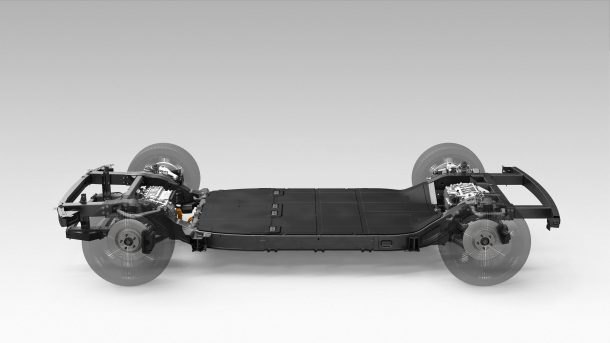Hyundai Taps California Firm for Joint EV Platform

Developing a new vehicle platform in-house is an expensive affair, making the cost of producing an electric vehicle from the ground up a heavy weight to place on an automaker’s balance sheet. Margins for such vehicles are currently slim, if not nonexistent. No wonder everyone’s trying to free up cash.
And yet, because the world has decided EVs are the future, automakers can’t be without them. Ford recently partnered with Michigan startup Rivian to source a platform for an upcoming Lincoln crossover, and now Hyundai has followed suit.
Hyundai and Canoo. Best buddies.
It’s not entirely an off-someone-else’s-shelf proposition. Hyundai has forged an agreement with California-based EV tech startup Canoo to jointly develop a new EV platform from the firm’s existing “skateboard” architecture. Rivian, you’ll recall, has a skateboard of its own, and it’s not shy about letting others use it.
Last September, Canoo slid the platform beneath a box-like EV it intends to sell via a subscription model in 2021.
“As part of the collaboration, Canoo will provide engineering services to help develop a fully scalable, all-electric platform to meet Hyundai and Kia specifications,” Hyundai said in a release.
“Hyundai Motor Group expects the platform to help facilitate its commitment to delivering cost-competitive electrified vehicles — ranging from small-sized EVs to Purpose Built Vehicles (PBV) — that meet diverse customer needs.”
As Hyundai has earned a lasting reputation as a purveyor of value-laden models, a steep markup for a so-badged EV model wouldn’t jibe with the brand’s credo. The current Ioniq Electric is certainly among the cheapest EVs on the market, but one compact hatch — joined by the Kona EV subcompact crossover last year — won’t cut it going into the 2020s. Corporate sibling Kia Motors hosts a similar amount of electrification in its showrooms.
Both brands will have to up the ante to reach Hyundai Motor Group’s goal of drawing 25 percent of its sales from green vehicles by 2025.
The automaker said it “expects an adaptable all-electric platform using Canoo’s scalable skateboard architecture to allow for a simplified and standardized development process for Hyundai and Kia electrified vehicles, which is expected to help reduce cost that can be passed along to consumers.”
Hyundai didn’t mention when the first Canoo-based vehicle might make it to production.
[Image: Canoo]

More by Steph Willems
Latest Car Reviews
Read moreLatest Product Reviews
Read moreRecent Comments
- Probert They already have hybrids, but these won't ever be them as they are built on the modular E-GMP skateboard.
- Justin You guys still looking for that sportbak? I just saw one on the Facebook marketplace in Arizona
- 28-Cars-Later I cannot remember what happens now, but there are whiteblocks in this period which develop a "tick" like sound which indicates they are toast (maybe head gasket?). Ten or so years ago I looked at an '03 or '04 S60 (I forget why) and I brought my Volvo indy along to tell me if it was worth my time - it ticked and that's when I learned this. This XC90 is probably worth about $300 as it sits, not kidding, and it will cost you conservatively $2500 for an engine swap (all the ones I see on car-part.com have north of 130K miles starting at $1,100 and that's not including freight to a shop, shop labor, other internals to do such as timing belt while engine out etc).
- 28-Cars-Later Ford reported it lost $132,000 for each of its 10,000 electric vehicles sold in the first quarter of 2024, according to CNN. The sales were down 20 percent from the first quarter of 2023 and would “drag down earnings for the company overall.”The losses include “hundreds of millions being spent on research and development of the next generation of EVs for Ford. Those investments are years away from paying off.” [if they ever are recouped] Ford is the only major carmaker breaking out EV numbers by themselves. But other marques likely suffer similar losses. https://www.zerohedge.com/political/fords-120000-loss-vehicle-shows-california-ev-goals-are-impossible Given these facts, how did Tesla ever produce anything in volume let alone profit?
- AZFelix Let's forego all of this dilly-dallying with autonomous cars and cut right to the chase and the only real solution.


































Comments
Join the conversation
Confused here. ...All this blather about "skateboards" and an accompanying illustration of what is most certainly a frame. Am I to understand that there is a going to be a resurgence of Body on Frame construction for EVs, or are these terms, and illustrations, being used as visual shortcuts for highly versatile, yet difficult to visualize unibody/monocoque style "platforms?"
..